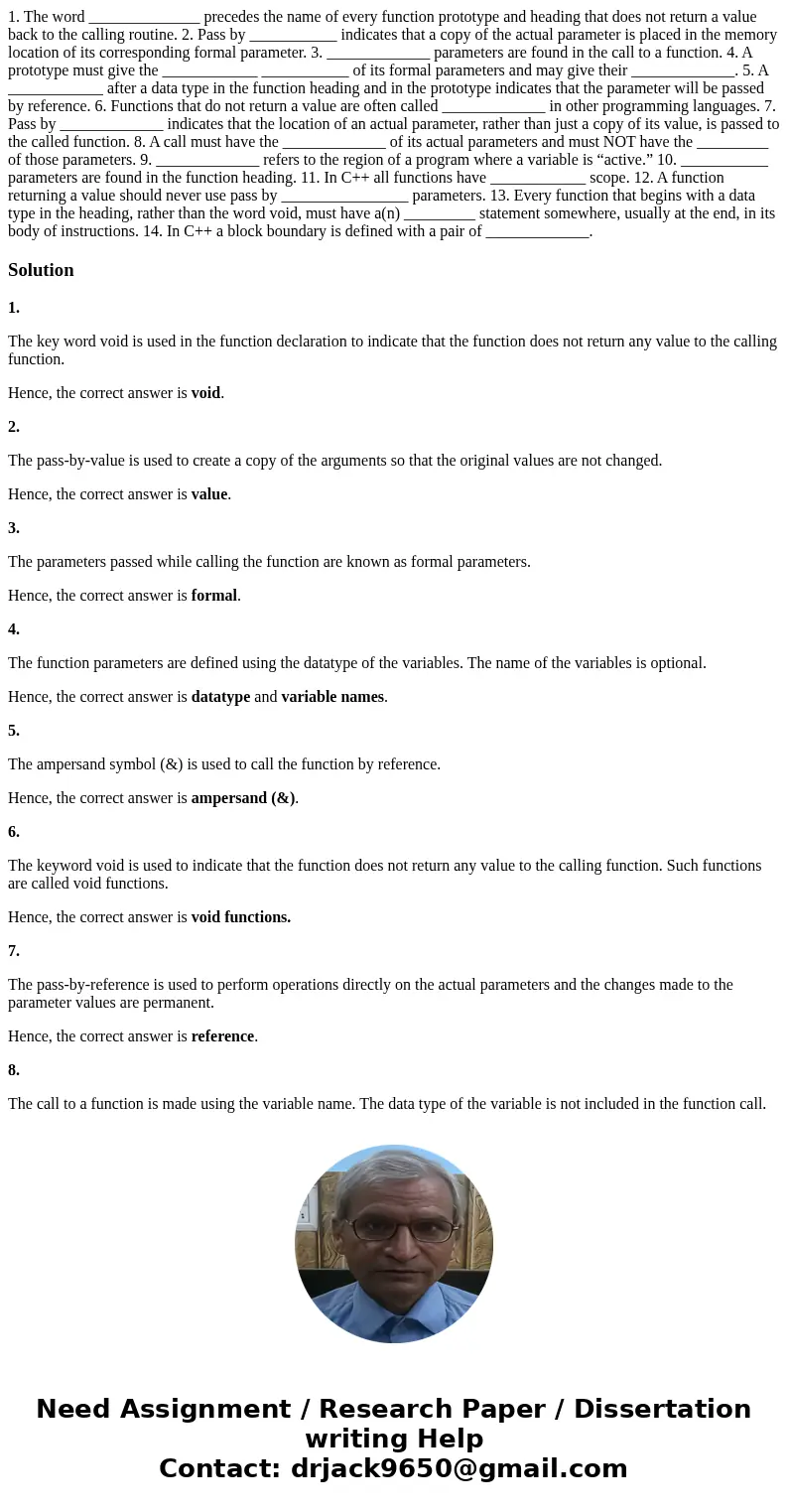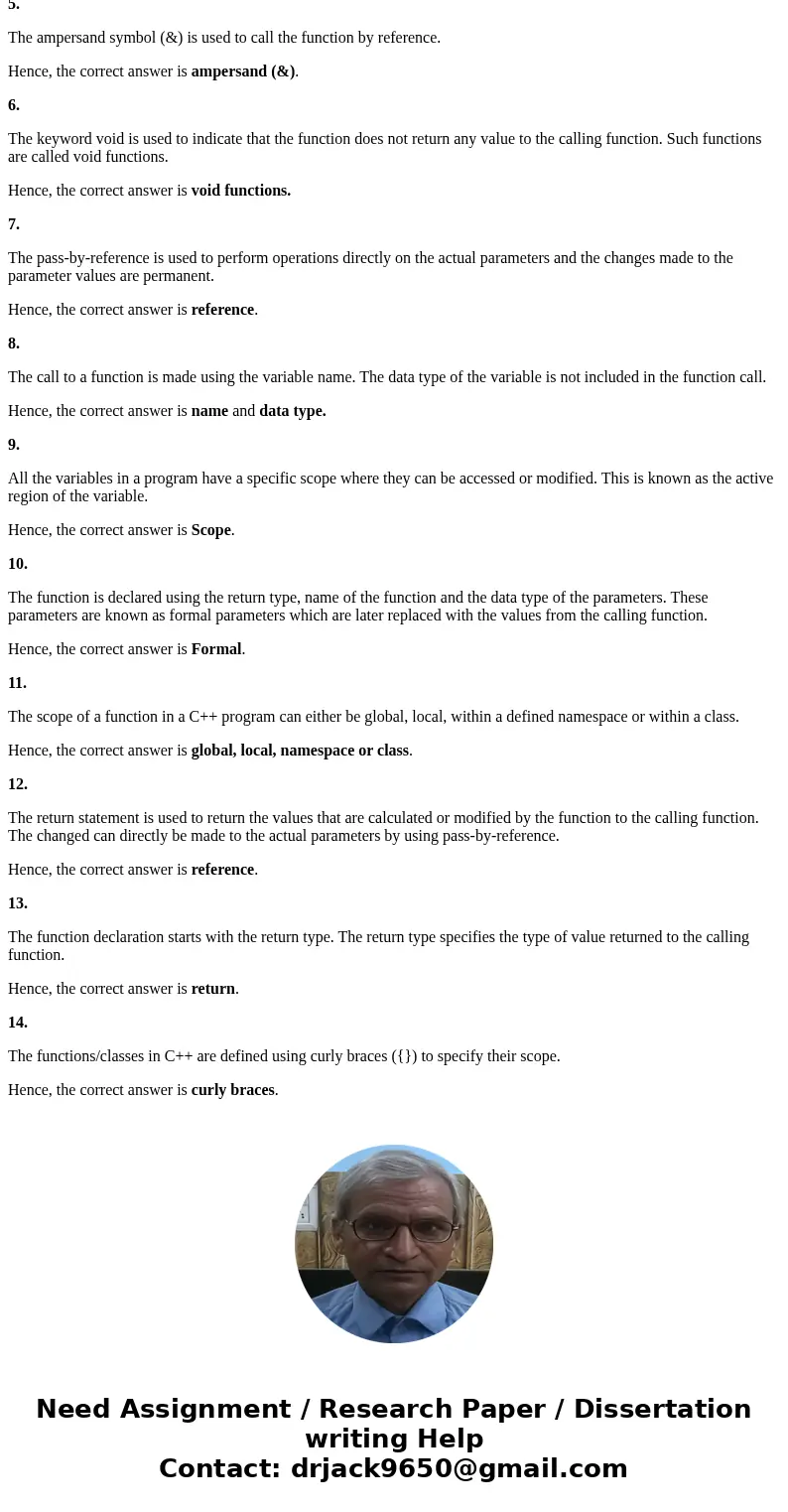1 The word precedes the name of every function prototype an
1. The word ______________ precedes the name of every function prototype and heading that does not return a value back to the calling routine. 2. Pass by ___________ indicates that a copy of the actual parameter is placed in the memory location of its corresponding formal parameter. 3. _____________ parameters are found in the call to a function. 4. A prototype must give the ____________ ___________ of its formal parameters and may give their _____________. 5. A ____________ after a data type in the function heading and in the prototype indicates that the parameter will be passed by reference. 6. Functions that do not return a value are often called _____________ in other programming languages. 7. Pass by _____________ indicates that the location of an actual parameter, rather than just a copy of its value, is passed to the called function. 8. A call must have the _____________ of its actual parameters and must NOT have the _________ of those parameters. 9. _____________ refers to the region of a program where a variable is “active.” 10. ___________ parameters are found in the function heading. 11. In C++ all functions have ____________ scope. 12. A function returning a value should never use pass by ________________ parameters. 13. Every function that begins with a data type in the heading, rather than the word void, must have a(n) _________ statement somewhere, usually at the end, in its body of instructions. 14. In C++ a block boundary is defined with a pair of _____________.
Solution
1.
The key word void is used in the function declaration to indicate that the function does not return any value to the calling function.
Hence, the correct answer is void.
2.
The pass-by-value is used to create a copy of the arguments so that the original values are not changed.
Hence, the correct answer is value.
3.
The parameters passed while calling the function are known as formal parameters.
Hence, the correct answer is formal.
4.
The function parameters are defined using the datatype of the variables. The name of the variables is optional.
Hence, the correct answer is datatype and variable names.
5.
The ampersand symbol (&) is used to call the function by reference.
Hence, the correct answer is ampersand (&).
6.
The keyword void is used to indicate that the function does not return any value to the calling function. Such functions are called void functions.
Hence, the correct answer is void functions.
7.
The pass-by-reference is used to perform operations directly on the actual parameters and the changes made to the parameter values are permanent.
Hence, the correct answer is reference.
8.
The call to a function is made using the variable name. The data type of the variable is not included in the function call.
Hence, the correct answer is name and data type.
9.
All the variables in a program have a specific scope where they can be accessed or modified. This is known as the active region of the variable.
Hence, the correct answer is Scope.
10.
The function is declared using the return type, name of the function and the data type of the parameters. These parameters are known as formal parameters which are later replaced with the values from the calling function.
Hence, the correct answer is Formal.
11.
The scope of a function in a C++ program can either be global, local, within a defined namespace or within a class.
Hence, the correct answer is global, local, namespace or class.
12.
The return statement is used to return the values that are calculated or modified by the function to the calling function. The changed can directly be made to the actual parameters by using pass-by-reference.
Hence, the correct answer is reference.
13.
The function declaration starts with the return type. The return type specifies the type of value returned to the calling function.
Hence, the correct answer is return.
14.
The functions/classes in C++ are defined using curly braces ({}) to specify their scope.
Hence, the correct answer is curly braces.


 Homework Sourse
Homework Sourse